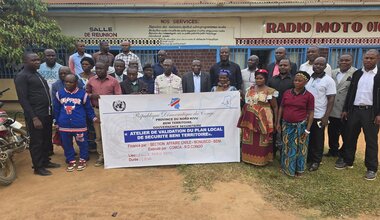Kivu: MONUSCO reinforces journalists' capacities in covering trials
16 September 2010 - From 30 August to 10 September, 60 journalists and media managers from North and South Kivu province took part in a workshop held respectively in Bukavu and in Goma to reinforce their capacities on media coverage of sexual violence trials. The training was organized by United Nations Joint Human Rights Office (MONUSCO-OHCHR) with the collaboration of the canadian NGO 'Journalists for Human Rights'.The objective is to improve the journalists understanding of the judicial system.
During four days, those journalists were explained legal texts such as the 2006 law on sexual violence. Experts on judicial proceedings joined the UNJHRO to shed light on the Congolese judicial system to participants.
For most of the journalists it was the first training of this kind and one of the few courses they had so far on human rights according to Prince Morola, a journalist at Radio Maria in Bukavu. "Such training helps us to respond more professionally when dealing with difficult and sensitive issues" added John Zyombo, journalist at Radio Star
Most of the participants are not specialized journalists as explained by Gabriel Lukeka, from the Congolese National Radio Television (TRNC) in Goma : "A journalist should have a full understanding of the vocabulary used, especially when dealing with legal matters which are sensitive by nature. We are working in an area where there are a lot of sexual violences due to conflicts. It was therefore necessary for us to understand these issues "
One of the core activities of the training was to enable journalists to move from theory to practice when covering a trial and assess the extent of difficulties the Congolese judicial system is experiencing. Most of the participants attended a trial for the first time. "What interested me in this training is the linking of practice to theory. We learned by doing "said Gabriel Lukeka.
Among the difficulties of the Congolese judicial system is the lack of basic logistics. In Bukavu, since the County Court does not have a bus to transport prisoners to the Tribunal the juges have to come to the Central Prison. In Goma, the Military Tribunal Courtroom looks like a warehouse, with a broken roof. As a result, the judges and defendants' voices are barely audible.
Defendants have sometimes no attorney to represent them or very little knowledge of procedural aspect. Prince Morola recalls that he had a surprise during his visit to the County Court in Bukavu. A defendant risking 20 years of jail for raping a minor was not represented for lack of means. "so I was appointed to assist him tough I am here as a journalist" and he adds 'We may share information to make things move". Pascaline Zamuda, in charge of programs on sexual violences at the women media association AFEM / South Kivu shares his opinion and says : "As a journalist, I can broadcast programmes destined to both the community and our targets - the victims of sexual violences- emphasizing the importance of respecting legal procedures so that sentences are passed without delay and implemented . Journalists have an important role to play in the fight against impunity" adds Morola.
In the Democratic Republic of Congo and particularly in North and South Kivu, armed conflicts have been one of the causes of sexual violences. Despite the adoption in 2006 of new laws severely punishing all sexual violences, the perpetrators are not always punished and situation of impunity persisted.
This special training was organised for the journalists in order to fight against impunity in sexual violence and is part of a joint programme sponsored by the Canadian Agency for International Development (CIDA).
 UN
UN United Nations Peacekeeping
United Nations Peacekeeping






